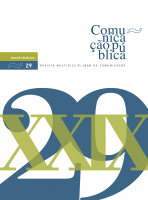Informed consent and intercultural communication in healthcare
Ethical problems and methodological challenges
DOI:
https://doi.org/10.4000/cp.10973Keywords:
healthcare, communication, centered, consentAbstract
The processes of shared decision-making and patient-centered communication are increasingly relevant in healthcare. The intercultural communication style of clinicians can be understood as a combination of general skills in patient-centered care and specific intercultural communication skills. Currently, obtaining an informed consent is a routine procedure. However, in patients from different cultures a significant number of factors may influence the way patients perceive an informed consent, questioning the Western model in place. We propose that rather than excessively focusing on the beliefs and attitudes of a specific group of subjects, which is an almost impossible task, healthcare professionals prioritize listening and empathically understanding the needs and preferences of patients.
Downloads
References
Alvarado, M., Ferron N.A.,& Krayem, N. (2016). Cultural differences and the understanding of informed consent (Degree of Bachelor of Science). Worcester Polytechnic Institute, Worcester,ReinoUnido. Disponível em: https://digitalcommons.wpi.edu/cgi/viewcontent.cgi?article=3573&context=iqp-all [Consultado em fevereiro, 29, 2020].
American Medical Association (AMA). (2002). Cultural competence compendium. Chicago: AMA.
Barnes, D. M., Davis, A. J., Moran, T., Portillo, C.J., & Koenig, B. A. (1998). Informed consent in a multicultural cancer patient population: Implications for nursing practice. Nursing Ethics, 5(5), 412- 423.
Benedek, W. (2014). Compreender os direitos humanos: Manual de educação para os direitos humanos. In V. Moreira & C.M. Gomes (Coords.), Direito à saúde (pp. 166-189). Coimbra: Ius Gentium Conimbrigae, Centro de Direitos Humanos.
Betancourt, J.R. (2006). Cultural competence and medical education: Many names, many perspectives, one goal. Academic Medicine, 81, 499-501.
DOI : 10.1097/01.ACM.0000225211.77088.cb
Convenção de Oviedo (1997). Convenção para a protecção dos direitos do homem e da dignidade do ser humano face às aplicações da biologia e medicina. Disponível em: http://www.dhnet.org.br/direitos/sip/euro/principaisinstrumentos/16.htm [Consultado em julho, 12, 2020].
Culver, C.M., & Gert, B. (1982). Philosophy in medicine. Nova Iorque: Oxford University Press.
Declaração de Helsínquia da Associação Médica Mundial. (2013). Princípios éticos para a investigação médica em seres humanos. Disponível em: https://ispup.up.pt/docs/declaracao-de-helsinquia.pdf [Consultado em fevereiro, 29, 2020].
Decreto-Lei n.º 48 de 15 de Março de 1995. Código Penal. Disponível em: https://dre.pt/web/guest/legislacao-consolidada/-/lc/107981223/202001160106/73474064/diploma/indice. [Consultado em fevereiro, 29, 2020].
Ekmekci, P. E., & Arda, B. (2017). Interculturalism and informed consent: Respecting cultural differences without breaching human rights. Cultura (Iasi), 14(2), 159-172.
DOI : 10.3726/CUL.2017.02.09
European Commision (2012). Structural changes in research institutions: Enhancing excellence, gender equality and efficiency in research and innovation. Disponível em: https://ec.europa.eu/research/swafs/pdf/pub_gender_equality/structural-changes-final-report_en.pdf [Consultado em fevereiro, 29, 2020].
Geertz, C. (1973). The interpretation of cultures: Selected essays. Nova Iorque: Basic Books.
Halkoaho, A., Pietila, A-M., Ebbesen, M., Karki, S., & Kangasniemi, M. (2016). Cultural aspects related to informed consent in health research: A systematic review. Nursing Ethics, 23(6), 698-712.
DOI : 10.1177/0969733015579312
Hemberg, J. A. B., & Vilander, S. (2017,). Cultural and communicative competence in the caring relationship with patients from another culture. Scandinavia Journal Caring Sciences, 31, 822-829.
DOI : 10.1111/scs.12403
Ho, E. Y. (2014). Socio-cultural factors in health communication. In N. G. Harrington (Ed.), Exploring health communication for multiple perspectives. (pp. 212-239). Nova Iorque: Routledge.
Ho, E. Y, & Robles, J. S. (2011). Cultural resources for health participation: Examining biomedicine, acupuncture, and massage therapy for HIV-related peripheral neuropathy. Health Communication, 26(2), 135-146.
DOI : 10.1080/10410236.2010.541991
Johnson, J. L, Bottorff, J. L., Browne, A. J., Grewal, S., Hilton, B. A., & Clarke, H. (2004). Othering and being othered in the context of health care services. Health Communication, 16(2), 255-256.
DOI : 10.1207/S15327027HC1602_7
ONU (1948). Declaração universal dos direitos humanos. Disponível em: https://nacoesunidas.org/wp-content/uploads/2018/10/DUDH.pdf [Consultado em julho, 12, 2020].
ONU (1966). Pacto internacional de direitos económicos, sociais e culturais. Disponível em: https://www.dge.mec.pt/sites/default/files/ECidadania/educacao_para_a_Defesa_a_Seguranca_e_a_Paz/documentos/pacto_internacional_sobre_direitos_economicos_sociais_culturais.pdf [Consultado em fevereiro, 29, 2020].
Paternotte, E., Dulman, S., Lee, V. D., Sherpbier, A. J. A., & Scheele, F. (2014). Factors influencing intercultural doctor-patient communication: Arealist review. Patient Education and CounselingCouns., 98, 420-445.
Paternotte, E., Dulmen, S., Bank L., Seeleman C., & Scherpbier, A. (2017). Intercultural communication through the eyes of patients: Experiences and preferences. International Journal of Medical Education, 8(5), 170-175.
Post, L. F., Blustein E. G., & Dubler, N. N. (1996). Pain: Ethics, culture, and informed consent to relief. The Journal of Law, Medicine & Ethics, 24(4), 348-359.
Ramos, N. (2007). Comunicação e interculturalidade nos cuidados sociais. Psicológica, 45, 147-169.
Renzaho, A. M. N., Romios, P., Crock, C., & Sonderlund, A. L. (2013). The effectiveness of cultural competence programs in ethnic minority patient-centered health care: A systematic review of the literature. International Journal for Quality in Health Care, 25(3), 261-269.
DOI : 10.1093/intqhc/mzt006
Simon, C.M., & Kodish, E.D. (2005). Step into my zapatos, doc:Understanding and reducing communication disparities in the multicultural informed consent setting. Perspectives in Biology and Medicine, 48(1), S123-S138.
Simon, C., & Mosavel, M. (2008). Key conceptual issues in the forging of “culturally competent” community health initiatives: A South African example. Cambridge Quarterly of Healthcare Ethics,17(2), 195-205.
Sousa, J., Araújo, M., & Matos, J. (2015) Consentimento informado. Panorama actual em Portugal. Revista Portuguesa de Ortopedia e Traumatologia, 23(1), 6-17.
Vallely, A. ,Leees. S. , Shagi, C., Kasindy,S. , Soteli, S. , Kavid, N. …Hayes, R. J. (2010). How informed is consent in vulnerable populations? Experience using a continuous consent process during the MDP 301 vaginal microbicide trial in Mwanza, Tanzania. BMG Medical Ethics, 11, 10.
Waugh, E., Szafran, O., Triscott, J. A. C., & Parent, R. (2016). Cultural competency skills for psychologists, psychotherapists, and counselling professionals: A workbook for caring across cultures. Canadá: Brush Education.
Downloads
Published
Issue
Section
License
Copyright (c) 2020 Direitos de Autor (c) 2020

This work is licensed under a Creative Commons Attribution-NonCommercial 4.0 International License.
Os conteúdos da Comunicação Pública estão licenciados com uma licença Creative Commons - Atribuição-NãoComercial 4.0 Internacional.


